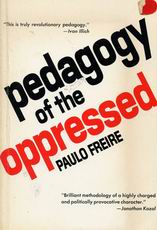

|
|

Pedagogy of the Oppressed
Freire, Paulo
http://www.marxists.org/subject/education/freire/pedagogy/index.htmhttp://www.marxists.org/subject/education/freire/pedagogy/index.htm Publisher: Continuum Publishing Company Year Published: 1970 Pages: 186pp Resource Type: Book Cx Number: CX6482 Freire maintains that every human being, no matter or "ignorant" or submerged in the "culture of silence," is capable of looking critically at the world in a dialogical encounter with others, and that provided with the proper tools for such an encounter, can gradually perceive his personal and social reality and deal critically with it. Abstract: Freire writes about the impoverished conditions of people in Third World countries. He argues that the best way to change their living conditions is to build a foundation on education and literacy for all. Then the people of these countries can help themselves. Self-actualization is a required step toward improving the world. A person must be aware of him or herself and be dignified before they will reach out to help others. The key to changing the structures of societies that oppress the lower class is giving the people the strength to struggle for themselves. There are four chapters in this translated edition. The first chapter describes the conflict between oppressed and oppressor and justifies the education of the impoverished. Freire claims that development and liberation must come from both the privileged and the poor in a mutual process. In Chapter 2 Freire discusses approaches to education and education's power to complete a person. Chapter 3 emphasizes the importance of dialogue and how it is improved by literacy. Chapter 4 compares antidialogics and dialogics as instruments of oppression and liberation. "Just as the oppressor, in order to oppress, needs a theory of oppressive action, so the oppressed, in order to become free, also need a theory of action." This theory of action can only be devised by an educated thinker and requires the action of the people in order to be executed. An educated and literate peasant can look critically at the world and rally others to help change it. One must be able to understand the political and social realities of his or her country in order to analyze it and come up with a strategy for radical reform. [Abstract by Mia Manns] Table of Contents Foreword Preface Chapter One The justification for a pedagogy of the oppressed; the contradiction between the oppressors and the oppressed, and how it is overcome; oppression and the oppressors; oppression and the oppressed; liberation: not a gift, not a self-achievement, but a mutual process. Chapter Two The "banking" concept of education as an instrument of oppression - its presuppositions - a critique; the problem-posing concept of education as an instrument for liberation - its presuppositions; the "banking" concept and the teacher-student contradiction; the problem-posing concept and the supersendence of the teacher-student contradiction; education: a mutual process, world-mediated; man as an uncompleted being, conscious of his incompletion, and his attempt to be more fully human. Chapter Three Dialogics - the essence of education as the practice of freedom; dialogics and dialogue; dialogue and the search for program content; the men-world relationship, "generative themes", and the program content of education as the practice of freedom; the investigation of the "generative themes" and its metrology; the awakening of critical consciousness through the investigation of "generative themes"; the various stages of the investigation. Chapter Four Antidialogs and dialogs as matrices of opposing theories of cultural action: the former as an instrument of oppression and the latter as an instrument of liberation; the theory of antidialogical action and its characteristics: conquest, divide and rule, manipulation, and cultural invasion; the theory of dialogical action and its characteristics: cooperation, unity, organization, and cultural synthesis. Subject Headings |